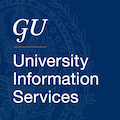UIS.104.1 Peer-to-Peer (P2P) Guidelines
In support of UIS.104 HEOA DMCA Policy

The Federal Higher Education Opportunity Act of 2008 (“HEOA”) includes provisions which are intended to reduce the illegal exchange of copyrighted works including through peer-to-peer or “P2P” file sharing.
Georgetown University Information Services (UIS) address violations of the 1998 Digital Millennium Copyright Act (DMCA) and the University Computer Systems Acceptable Use policy, to mitigate liability issues, and to minimize device infections associated with illegal and unsafe content downloads.
What is P2P sharing?
Peer-to-peer (P2P) file sharing is a practice of connecting to other users around the corner or around the world through software that links users as “peers.” Peers make their folders and files available for sharing or distribution to any one that can link to them through P2P software.
P2P sharing can be used for various academic and research purposes, and the intent of this policy is not to stifle those pursuits. However, while it has its benefits, P2P software also has major security, network, and financial drawbacks.
Understanding P2P Liabilities
- Security risk
Use of peer-to-peer protocol is done with a “torrenting” client, which creates connections with hundreds of other users all over the internet. Many of the clients available and the files you are accessing are embedded with spyware or ransomware and can leave your computer vulnerable to attack from outside parties.
- Unfair use of internet bandwidth
Torrenting files is typically a large, constant drain on a network. This negatively affects the speed and reliability of everyone else’s internet connection on campus.
- Penalties for illegal activity
Illegal file sharing is a violation of the Georgetown University Computer Systems Acceptable Use Policy and the Federal law. Therefore, UIS is obligated to investigate every complaint of copyrighted materials being shared illegally on its network. Repercussions of continued activities like these can include blocking Georgetown from those networks and hefty fines.
- Legal Alternative Resources for Music, Video, and other media
Faculty who use peer-to-peer protocols to distribute class materials are encouraged to use Google Drive instead. Individuals looking for legal alternatives available to obtain movies, television shows, music, and books can check out the Educause list of Legal Sources of Online Content.
Supporting Documents
